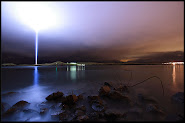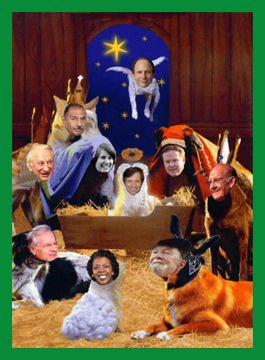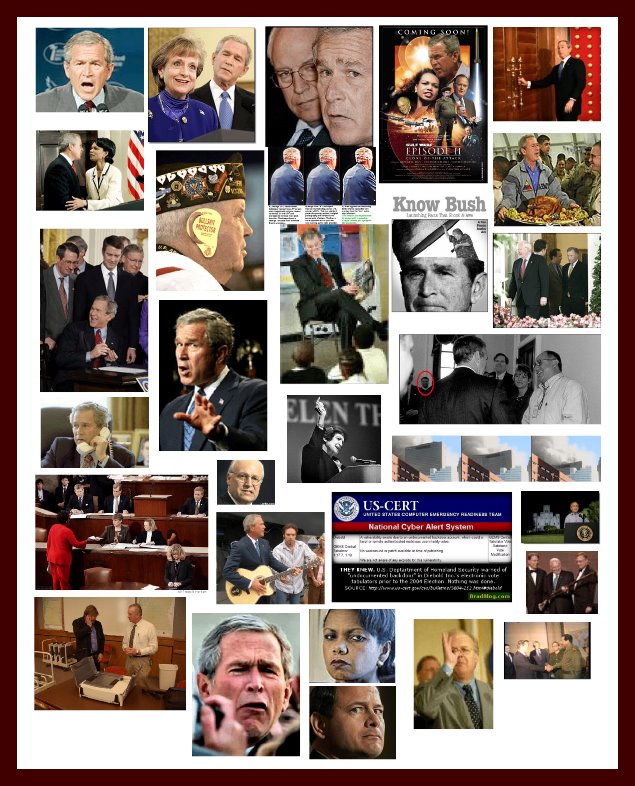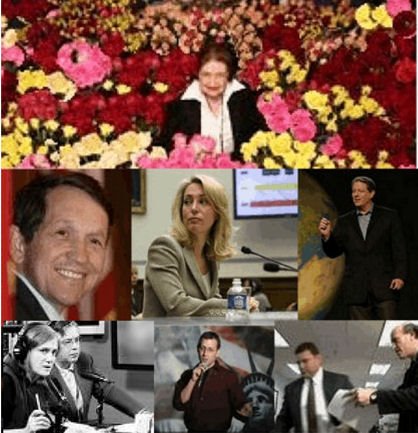For Participants --Today, at the
U.S. Social Forum in Atlanta 2007 And
Everywhere else...
The U.S. Attorney Firings Scandal is not just about the Politicization of Government agencies.
It is about
Election Theft - both Past and Future.
It is about
Rewarding . . .
and
Protecting. . .
the
Thieves.
It is also about our letting it - or not letting it - happen.
It is about the Press - Investigating and Reporting.
It is about Paying Attention - or not.
Then it is about being Responsible for what we've Learned - and
doing something.
After all, what if the actual recipient of the most votes in either of the last two Presidential elections had actually become President?
How much
human suffering - in this generation and generations to follow - would not happen if Bush/Cheney never took the White House?
So, what is the appropriate punishment for conspiracy to usurp executive power by sabotaging the Presidential elections? What about
financial liability for the damages, both at home and abroad?
The Lawyers in charge - both as Lobbyists and Justice Department Protectorates - have had to be on their toes, and out of the Limelight.
And the news media has had to be, well... bought.
Yet there are still some who dare to pry - and to tell what they've found. These days they are rare, and tend to be a bit obnoxious in their fervent determination be heard.
The two I have depended on for years are Greg Palast and Brad Friedman. Funny enough, they have each separately provided enormous specific details about different operations by the Bush/Cheney/RNC's election campaigns that are now hovering at the edge of the dangerous spotlight of the U.S. Attorney Purge scandal, making this administration and its operatives squirm (and, as of June 28th, 2007, claim Executive Privilege).
It's time to push them into the spotlight and
bang our pots and pans. So here's what you need to know:
PURGING THE PURGERS
It started with
Greg Palast .
In December 2000 Greg had the story that should have changed history, but the major media didn't want to touch it. On December 4th, 2000, one week before Bush v Gore went before the Supreme Court, the online magazine Salon posted his article "
Florida's flawed 'voter cleansing' program", describing Florida Secretary of State Katharine Harris's purging approximately 173,000 names from the Florida voter registry based on a deliberately inaccurate list of Florida felons. [1.]
The article was overlooked and Harris got away with it.
Leading up to the 2004 election, emails from the Republican National Committee were accidentally sent to the wrong address, and then were forwarded to Greg. The emails included attachments titled "Caging Lists" and were proof of another Republican vote-purging strategy. He wrote about it on January 26, 2005 with the Reverend Jesse Jackson in their article "Jim Crow Returns to the Voting Booth" [2]:
"In November 2004, for the first time since the era of the Night Riders, one major political party launched a program of mass challenges of voters on Election Day. Paid Republican operatives, working from lists prepared by the party, fingered tens of thousands of voters in Ohio, Florida and elsewhere, questioning their right to a ballot.
"One of these secret 'caging lists' was obtained by BBC Television from inside Republican campaign headquarters in Florida. Every one of the voters on those sheets resided in African American neighborhoods, excepting a few in precincts of elderly Jewish voters.
"These lists helped Republican poll workers challenge voters on the basis of an alleged change of address. An analysis of one roster showed that several of those facing challenge were African American soldiers whose address changed because they were shipped overseas.
"Challenged voters were shunted to 'provisional ballots,' which, in Ohio and elsewhere, were not counted on the flimsiest of technicalities."
Palast's June 2006 book,
Armed Madhouse: Who's Afraid of Osama Wolf?, China Floats, Bush Sinks, The Scheme to Steal '08, No Child's Behind Left, and Other Dispatches from the Front Lines of the Class War, went into further detail about the caging lists, and his article of June 16, 2006, "
Buffalo Soldiers Scrubbed by Secret GOP Hit List" names Republican national Research Director and Deputy Communications chief, Tim Griffin, as the operative distributing thousands of names and addresses to state campaign chairmen and party leaders as "Caging lists". [3]
"Here's how the scheme worked: The RNC mailed these voters letters in envelopes marked, "Do not forward", to be returned to the sender. These letters were mailed to servicemen and women, some stationed overseas, to their US home addresses. The letters then returned to the Bush-Cheney campaign as 'undeliverable.'
"The lists of soldiers of 'undeliverable' letters were transmitted from state headquarters, in this case Florida, to the RNC in Washington. The party could then challenge the voters' registration and thereby prevent their absentee ballots being counted."
In addition to the military home addresses, letters were sent to homeless shelters, and...
"A check of the demographics of the addresses on the 'caging lists,' as the GOP leaders called them indicated that most were in African-American majority zip codes."
Now it is 2007, and in the midst of a scandal about fired U.S. Attorneys, we learn that Karl Rove's former deputy was named to replace Bush appointee Bud Cummins as U.S. Attorney for Arkansas, with Cummins forced to resign five days later. Any deputy of Karl Rove's who is suddenly given a new job should be looked at, and sure enough, that deputy was none other than Timothy Griffin.
Since that news appeared, Greg has done his best to point out the connection, and has written about it extensively in frequent articles, such as the blunt "
Bush's New US Attorney a Criminal?" on March 28th. [4]
The release of the paperback version of his book, so full of additional material that he changed its title to to
Armed Madhouse: From Baghdad to New Orleans - Sordid Secrets and Strange Tales of a White House Gone Wild [5], exploded with a party on May 1st with Air America Radio's Randi Rhodes and Robert F. Kennedy, Jr. at the New York Community Church.
This excellent timing has given him more opportunities for appearances with Common Dream, BuzzFlash, Ring of Fire Radio [6] ), Scoop [7], and Democracy Now [8] ) - spreading this important story - though still only reaching a smaller audience.
Then former White House Liaison for the Justice Department Monica Goodling testified before the House Judiciary Committee and at the top of her opening written statement, she nailed Deputy Attorney General Paul McNulty for not being "fully candid", saying he...
"...failed to disclose that he had some knowledge of the White House's interest in selecting Tim Griffin as the interim U.S. attorney in the Eastern District of Arkansas, inaccurately described the department's internal assessment of the Parsky commission, and failed to disclose that he had some knowledge of allegations that Tim Griffin had been involved in vote- cadging during his work on the president's 2004 campaign." [9]
Though that revelation slipped past without much ado, Palast shined a light on it in his May 29th "
The Goods on Goodling and the Keys to the Kingdom". [10]
Two days later, Palast met with John Conyers, Jr., the Chairman of the House Judiciary Committee, to interview him for the BBC. Palast showed Conyers the caging lists. Palast reports that Conyers response was, "We're not through with Griffin by any means."
That same day, May 31, 2007, Timothy Griffin suddenly resigned as the U.S. Attorney in Arkansas, effective the next day. [11]
Griffin's attempt to play the victim was rebuked by "
The Tears of a Clone" on June 15, 2007 [12], and by June 18th, the younger brother of the late Attorney General Bobby Kennedy stood up to demand the truth. That day, Senator Edward Kennedy and Senator Sheldon Whitehouse announced that they had sent a letter to Attorney General Alberto Gonzalez at the Department of Justice:
"We write to request that the Department of Justice promptly investigate allegations that the Republican National Committee engaged in "vote caging" during the 2004 elections. We also ask that you investigate whether any Department officials were aware of allegations that Tim Griffin had engaged in caging when he was appointed United States Attorney for the Eastern District of Arkansas, and whether appropriate action was taken. Caging is a reprehensible voter suppression tactic, and it may also violate federal law and the terms of applicable judicially enforceable consent decrees." [13]
Two days later, on June 20, it was reported that Arkansas Senators Blanche Lincoln and Mark Pryor were also in support of the investigation. [14].
When Paul McNulty appeared before the House Judiciary Committee on June 21, 2007, to try to expand upon his original testimony Congressman Conyers was more pointed in his questions.
Conyers: Thank you Madam Chair. Now you never, did you just say you didn't know anything about caging?
McNulty: What I said was that when I was asked that question at the Senate hearing, all I knew about the subject was that there was an article.
Conyers: Was that article by Greg Palast about African American soldiers scrubbed by secret GOP hit lists? Dated June 16, 2006? Was that it as you recall?
McNulty: That's the article I'm referring to.
Conyers: And didn't Monica Goodling tell you that caging might come up at the hearing as she was briefing you?
McNulty: Yes that's correct.
Conyers: And did it come up?
McNulty: It did.
Conyers: And you didn't, & your response was you never looked at the caging even though Goodling told you. You saw the Greg Palast article & it was put in your in briefing testimony for the Senate in your briefing book
McNulty: Right.
Conyers: And you didn't look at the material in your briefing book outside of the article?
McNulty: Mr Chairman I didn't read the article, I was aware the article existed because Senator Prior referred to it in his testimony right before I got up to testify & Ms Goodling had raised the issue the day before. But I had not read the article & not become familiar with the issue, even if I had read that article Mr Chairman, if I just may say so, even if I had read that article, & I was asked that question again by Senator Schumer, I would still be very careful before I started speaking because, information based upon just one article
Conyers: But there was more in your briefing book.
McNulty: There was another Tim Griffin e-mail which gave his explanation of that article which I have now seen but I hadn't read before I testified.
Conyers: So could I infer that caging of black voters may not have been one of the high items on your list as your responsibility as Dep AG?
McNulty: Well I'm not sure what you mean by that.
Conyers: What I mean by it is, Goodling told you about it, it's in your case, it's in your Senate testimony & yet you fail to answer questions on the subject before the Senate & you tell me even now, as of today have you looked at it yet?
McNulty: I have now read the article & I've read that e-mail
Conyers: I mean the whole subject matter of caging. I mean this disenfranchises lots of people. Well first of all, you know caging is challenging lists of voters that are usually minority voters
Unidentified voice: Would the gentleman yield because I think Ms Goodling's testimony slightly inaudible
Conyers: Wait a minute, let me just finish my question, I'll get back to you Chris, I always do, you know that. But we've got a whole chain of testimony, this is one of the big issues that came out of, at least a couple of major elections of this country, & you're saying 'yes I was told about it, yes it was in my tab in the briefing book for Senate testimony & yes I looked at Palast's article but I didn't read it'. Why does it not generate much concern or attention to you this for me, voter rights is one of the big problems that we have in terms of having it enforced in the Department of Justice? [15]
*******
Then there was
Brad Friedman. It was during my frantic Googling in the wake of the unfathomable outcome of the 2004 election that I discovered bradblog. The press was ignoring the ground swell of doubt, but I dug daily for information on the Ohio recount and hearings by the Democratic minority members of the House Judiciary Committee.
A story and an affidavit jumped at me, about a computer scientist named Clint Curtis revealing a dark story about Republican Congressman Tom Feeney commissioning software in 2000 to change electronic voting results - presumably to be ready for the dastardly deed by Democrats, but suddenly appearing more ominous. Anywhere I found the affidavit, it always had the green and gold www.bradblog.com logo at the top, marked Exclusive! [16]
A little obnoxious, but very interesting... especially when bradblog also followed Curtis's testimony before some of the Committee members. [17]
In those painful early months after the election, I continued writing my Know Bush Facts, covering Conyer's January 6th report, "
What Went Wrong in Ohio?"[18], the private inauguration luncheon for the most generous donors and what they wanted for it, and was in the midst of gathering info on Bush's military records and the vengeful two-fer strike on Dan Rather and Bill Burkett, when I saw the announcement on March 24, 2005 -
George W. Bush created a new Federal Election Reform Commission, to be lead by Jimmy Carter and - further down in the story, far less noticeable - James A. Baker, III.
I gasped.
While better known as the former Secretary of State, my earlier research had shown that Baker's far more important role as the lawyer whose firm, Baker Botts, had been setting up and rescuing George W. Bush at least since his early days in baseball, oil and illegal Harken stock dumping, and that he had lead the legal charge on the 2000 election that landed George in the White House - and he was General Counsel for The Carlyle Group. This was clearly a set up to protect Bush and election theft. I dropped everything to tear into this.
Bradblog was already on it. And he had lots more.
On March 22, 2005, Brad wasted no time in discrediting the expert witness designed to counter the evidence of voter suppression in Ohio presented Conyer's team, "
Blackwell Finally Testifies in OH as a New 'Voters Rights' Group Appears 'Talon News-style' out of Nowhere...." [19]
Congressman Bob Ney (now in prison) chaired the House Committee on House Administration and finally got around to holding hearings on the 2004 election. On May 21, Mark F. (Thor) Hearne testified as a leader of the "non-partisan" American Center for Voting Rights, the only voting organization invited to testify.
Brad also nailed Hearne as being the National Election Counsel to Bush-Cheney '04 and Missouri counsel to Bush-Cheney 2000, positions he failed to disclose to the Committee. In additional, Brad reported that this great ACVR, with its 31 page report pushing allegations of "criminal voter fraud", appeared for the first time on only four days earlier, when it posted a website on March 17th.
Later on that same March 22nd 2005, Brad had more in
"New 'Non-Partisan' 'Voting Rights' Org Appears Little More than Republican Front Group!". The publicist for ACVR was Jim Dyke, the Communications Director for the Republican National Committee. [20]
Over the next few days, Brad was amazing, tracing the domain registration of the ACVR to Dyke Associates in D.C., and sending a camera crew to visit the address of its Dallas office - only to find a dinky mail box in a Dallas UPS Store - odd, because neither Hearne nor Dyke were in Dallas --
Mystery Solved! Location of 'American Center for Voting Rights' Found! Exclusive Photographs! Photos Suggest ACVR Website Developers Most Likely Very Very Tiny Republicans! [21]
On April 12th 2005, Brad reported that Mark F. "Thor" Hearne, General Counsel to the American Center for Voting Rights, was listed on the Advisory Academic Board of the Carter Baker Commission, and that John Conyers, Jr. had just written to Jimmy Carter, voicing his strong concerns about the inclusion of James Baker on an Election Reform Commission at this important time. [22]
Conyer's communication with both Carter and Dr. Robert Pastor, the Executive Director of the Commission, was fruitful, and on April 21st, Conyers telephoned Brad to thank him personally for his diligent effort in educating the public as to the "unacceptable" make up and direction of the Commission, and to let him know he would continue to meet with members of the Commission over the next few months and put the word out through his own blog. [23]
On August 2005, the ACVR released its absurd counter-Conyers report, "
Vote Fraud, Intimidation & Suppression In The 2004 Presidential Election" which was publicized throughout the right wing internet and through such media as Rush Limbaugh, and then was used continually to push the non-issue of fraudulent voting and voting registration. [24]
And every time the ACVR, Hearne, Dyke, or its later token pseudo-Democrat Brian Lunde did anything, Brad was there to cover it, with constant reminders of its illegitimate claims and phony non-partisan guise.
Jack Abramoff's name came awfully close, on the way to indicting Bob Ney, Hearne still tried to push voter fraud, and was allowed a seat on the Board of the now-discredited Elections Assistance Commission, but for the most part, the Republican operatives slithered back to work on other trickeries.
Brad was pretty busy himself, finding much to stir up in 2006. December 2005 brought not only the revelations about NSA and domestic spying -
Diebold met Hursti in Florida, and the proof was in - HACK HACK HACK HACK HACK. [25] So 2006 found Brad at the forefront of busting Diebold [26], Sequoia, ESS, HAVA, and the EAC, primary fumbles, Secretaries of State, both heroic and slimy election officials, unmarked ballots, overpriced recounts and demanding each vote be counted fairly.
Then, the annoying spokesman/expert of the American Center for Voting Rights - Mark J. "Thor" Hearne - popped up in the shadows of the U.S. Attorney Purge, looking nervous, so Brad took a look. And the more Brad looked, the more dirt Brad found, once again.
Jim Dyke had moved on to work for Dick Cheney's office, and Thor Hearne was back at his Missouri law firm, Lathrop & Gage LC.
On March 15, 2007, Brad wrote
EXCLUSIVE: New Details on the Phony 'Voter Fraud' Angle in the U.S. Attorneys Purge Scandal... An Insider's Report from a New Mexico Election Attorney on the Firing of David Iglesias and the Rove/DoJ/Republican Efforts to Create a 2004 'Voter Fraud' Scare in the State... RELATED? - The GOP 'Voter Fraud' Front Group ACVR Goes Suddenly AWOL!.[27]
This treat tells the story of the ties between voter fraud accusations, the sudden disappearance from the Internet of the American Center for Voting Rights, the scrubbing of its website and references to it anywhere near Hearne's name, and the release of an important new study by Lorraine Minnitte, Ph.D. entitled "
The Politics of Voter Fraud", finding that
voter fraud is extremely rare and that allegations are frequently politically motivated.[28]
On April 19, 2007, the day Alberto Gonzalez testified before the Senate Judiciary Committee, Brad's headline was a headspinner:
A Direct, As Yet Unreported Connection in the U.S. Attorney Purge Scandal Leading Straight to the White House - Arkansas U.S. Attorney Bud Cummins Was Fired Just After Reports Surfaced of Investigation into Law Firm of Top Level White House/GOP Operative and Close-Friend-of-Rove, Thor Hearne - Prosecutor Was Replaced by Rove Aide Timothy Griffin... And there was that name from the Greg Palast side - Timothy Griffin. [29]
Brad's digging revealed that [
Hold on to your hats] Hearne's law firm in Missouri, Lathrop & Gage LC, was running an extremely tangled and corrupt scheme - franchising satellite state licensing offices to provide millions of dollars to the generous supporters of Missouri Governor Matt Blunt (son of Republican House Minority Whip Roy Blunt), so those supporters could better support.
The Missouri U.S. Attorney who should have investigated this, Todd Graves, bowed out due to a contract for motor vehicle licenses held by his wife's company. Graves abruptly resigned, and was replaced by Bush's appointee to the DoJ's Civil Rights Division, the inexperienced but loyal Bradley J. Schlotzman (who recently testified that he had sometimes bragged about all the Republicans he'd hired at the Division).
The responsibility of investigating the Missouri governor then went to the U.S. Attorney for Eastern Arkansas, Bud Cummins.
In "
THE UNDERLYING CRIME: White House Interference into a U.S. Attorney's Criminal Investigation in Missouri", Brad reported that when Cummins' investigation of Governor Blunt and the Lathrop & Gage LC legal team was reported in May 2006, Hearne's years of RNC/Karl Rove operations and ties came in handy. He was able to bring on board the powerful Dallas corporate defense attorney and Department of Justice Corporate Fraud "Point Person", William B. Mateja, who personally telephoned U.S. Attorney Cummins several times to ask if he was investigating his client, Governor Matt Blunt. [30]
A couple of weeks go by and on June 5, 2006, Bud Cummins was told by the Director of the Executive Office for U.S. Attorneys, Mike Battle, that he would be expected to resign, and in September, Timothy Griffin was sent to train with Cummins, presumably as his assistant.
On the day that Brad tied Hearne's Missouri law firm to the Attorney Purge scandal, April 23rd, Lathrop & Gage's CEO (and soon to be Chairman), Tom Stewart, suddenly left on a 90 days sabbatical. On May 17, 2007, it was announced that he was gone for good. [31]
Okay, did you follow that?
Don't worry, you won't be tested - yet. The good news is that Bradblog has his
key articles on Thor Hearne and the American Center for Voting Rights listed chronologically here or just go the website www.bradblog.com and look for the
Special Coverage section (currently on the right and down a bit, where you can select: "American Center for Voting Rights". GOP 'Voter Fraud' Scam.
While you're there, stroll around a bit. There are links to other areas of very Special Coverage, published articles, media appearances, archives of his radio show, and even his other career in theatre and film.
Both Greg Palast and Brad Friedman are happy to accept donations on their websites and by mail to support their investigative work.
SO NOW, THE SIMPLE VERSION OF ALL OF THE ABOVE:
I.
Greg Palast www.gregpalast.com A. Investigative Reporter for BBC Newswatch, Harpers, Democracy Now! Ring of Fire Radio and more
B. Reported after 2004 election that Kerry won, but the Republican tactic of caging lists and dumping votes, managed by RNC operative and Karl Rove assistant
Timothy Griffin, caused tens of thousands of votes for Kerry to be dumped.
C. Story returns in U.S. Attorney Scandal when
Timothy Griffin is discovered to be the Gonzalez-appointed interim U.S. Attorney in Arkansas, where he can best dig for dirt on Hilary Clinton. On learning that Congressman John Conyers, Jr. has met with Palast, Griffin suddenly resigns.
II.
Brad Friedman www.bradblog.com A. Participant in USSF 2007 - Investigative Blogger, Activist, and radio host with special expertise in elections, contributor to Huffington Post and more
B. Reported after 2004 election that
“non-partisan” American Center for Voting Rights’ expert spokesman, Mark “Thor” Hearne, is RNC/BushCheney operative spreading disinformation about vote fraud to counter real evidence of vote theft and suppression.
C. Story returns in U.S. Attorney Scandal when
Thor Hearne gets U.S. Attorney Bud Cummins fired and replaced by Timothy Griffin to stop investigation into his law firm’s fundraising for Republican governor with franchised state license fees. On learning that Conyers and Leahy are paying attention, the ACVR suddenly disappears.
DEMAND THESE STORIES GET NATIONAL ATTENTION. WRITE, POST, CALL EVERYONE, EVERYWHERE.
DEMAND THE USURPERS BE STOPPED. It is your responsibility now.
Resources
1. http://www.gregpalast.com/floridas-flawed-voter-cleansing-program-saloncoms-politics-story-of-the-year/#more-937 or http://archive.salon.com/politics/feature/2000/12/04/voter_file/index.html.
2. http://seattlepi.nwsource.com/opinion/209316_palastjackson26.html
3. http://www.gregpalast.com/massacre-of-the-buffalo-soldiers/
4. http://www.gregpalast.com/bushs-new-us-attorney-a-criminal
5. http://www.gregpalast.com/order-the-book/
6. http://www.ringoffireradio.com/show.asp?jid=160 ; http://www.ringoffireradio.com/show.asp?jid=167 ; http://www.ringoffireradio.com/show.asp?jid=169 ; http://www.ringoffireradio.com/show.asp?jid=173
7. http://www.scoop.co.nz/stories/HL0704/S00338.htm
8. http://www.democracynow.org/article.pl?sid=07/05/14/1426254
9. http://www.washingtonpost.com/wp-srv/politics/transcripts/goodling_testimony_052307.html
10. http://www.gregpalast.com/the-goods-on-goodling-and-the-keys-to-the-kingdom/
11. http://www.bradblog.com/?p=4620
12. http://www.gregpalast.com/the-tears-of-a-clone/#more-1762
13. http://kennedy.senate.gov/newsroom/press_release.cfm?id=56FBB230-3DBB-43FB-BE74-1110CF30FE16
14. http://www.arkansasnews.com/archive/2007/06/20/WashingtonDCBureau/342468.html
15. http://www.washingtonpost.com/wp-srv/politics/documents/mcnulty_transcript_062107.html
16. http://www.bradblog.com/Docs/CC_Affidavit_120604.pdf
17. http://www.bradblog.com/?p=1050
18. http://www.truthout.org/docs_05/010605Y.shtml
19. http://www.bradblog.com/?p=1276
20. http://www.bradblog.com/?p=1277
21. http://www.bradblog.com/?p=1283
22. http://www.bradblog.com/?p=1317
23. http://www.bradblog.com/?p=1342
24. http://www.bradblog.com/?p=1651
25. http://www.bradblog.com/?p=2157
26. http://www.bradblog.com/Diebold.htm
27. http://www.bradblog.com/index.php?p=4276
28. http://projectvote.org/fileadmin/ProjectVote/Publications/Politics_of_Voter_Fraud_Final.pdf
29. http://www.bradblog.com/?p=4429
30. http://www.bradblog.com/?p=4447
31. http://www.bradblog.com/?p=4568
See also this posting
here.

























